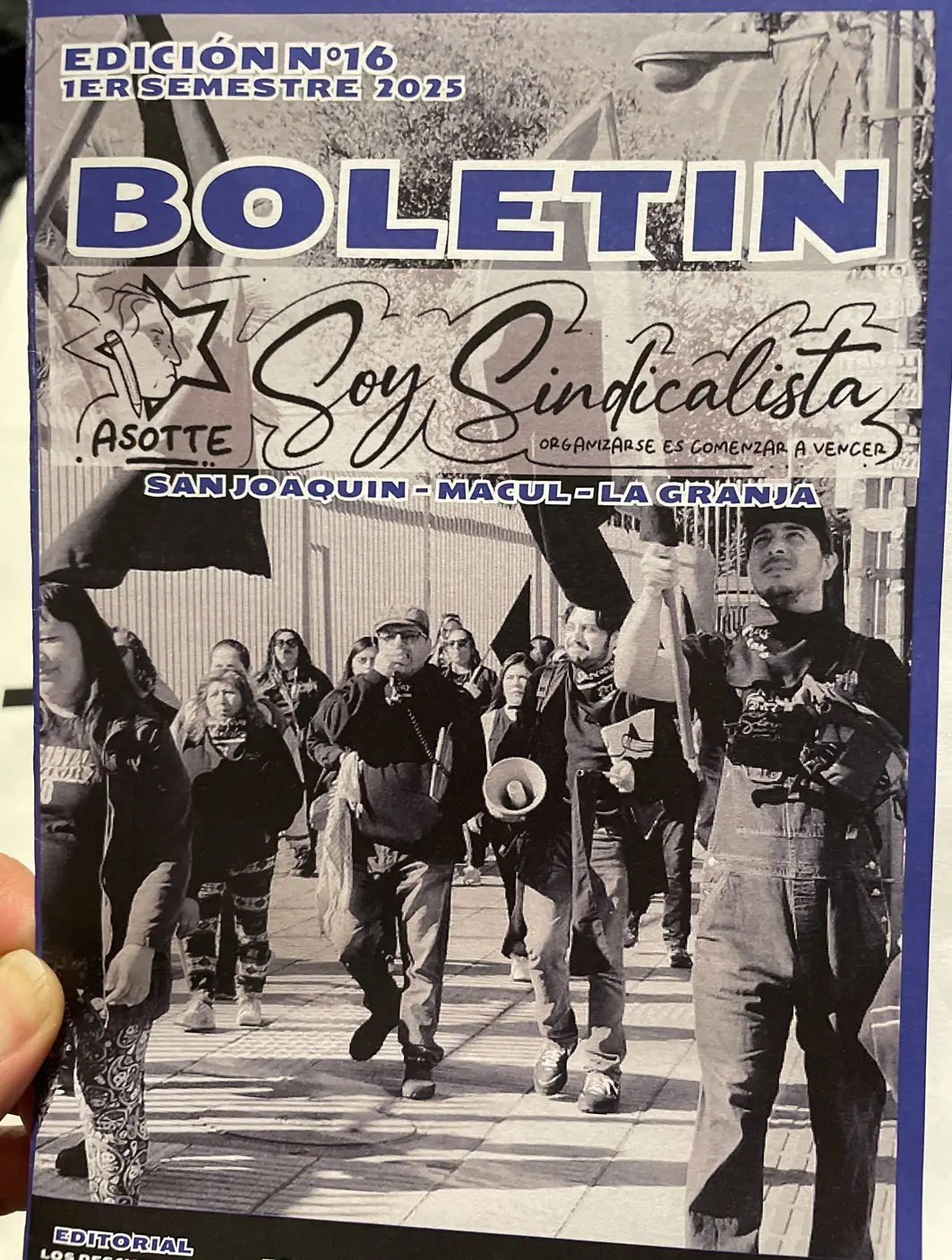
Chile: Interview with Asotte – Association of Education Workers
We hereby share an unofficial translation of an article from the the newly published edition of the newspaper El Pueblo.
In an effort to contribute to the struggles of different sectors of workers, we at El Pueblo newspaper met with Cristian Arenas, history teacher and general secretary of ASOTTE, to learn about his experience organizing and fighting at the Gabriela Mistral Local Public Education Service (SLEP).
By Celia Araya
The origin of this Association of civil servants is the SIPROFED union, which already existed before the transfer to SLEP in 2020.
The State grants existing unions a period of two years to transform themselves into civil servant associations, as the Chilean public administration system does not recognize the right to unionize or strike, and unions are illegal. Thus, ASOTTE was created in 2022 as an association that brings together education workers, regardless of the role they perform in educational establishments or work units, as they themselves call them.
Understanding themselves as a struggle union
This association brings together approximately 650 members, including teaching assistants and teachers, and is the only one of the seven organizations in the SLEP with this particular characteristic. The SLEP Gabriel Mistral brings together the municipalities of La Granja, San Joaquín, and Macul, in the city of Santiago, and is made up of 39 work units, including kindergartens, with approximately 2,400 employees in total.
The strength of this association lies in its class-based unionism. Although they are legally designated as an association, they see themselves and are understood as a struggle union. All members know that this is the union’s approach, that a large part of their dues goes toward maintaining a staff of lawyers and preparing for mobilizations.
In addition, they proudly mention that their union is made up of 80% women, which gives them the strength and resilience to face adverse situations.
The association comments that, although it sits down to negotiate with the employer, the main focus is on mobilization and organization among the work units. In other words, if a lawsuit is filed in one school, it is shut down, and the others, which may not be directly affected, quickly show solidarity. This generates a force that has an impact on the employer, since ASOTTE has a presence in 25 of the 39 work units of the SLEP.
Always thinking about the future of the workers’ organization, union training schools, leadership training, workshops, and discussions are also held to disseminate the work done and to discuss
and analyze the political situation in which education in Chile is currently developing.
Public sector without the right to collective bargaining
In defending the interests of its members, ASOTTE has to confront the State employer, which does not allow collective bargaining, unions, or work stoppages. Despite this, they managed to push through a “protocol of agreement” that focuses mainly on the working conditions of those who work in education in the SLEP.
As it was not a request focused on salary demands or monetary allocations, but rather on the “habitable conditions of schools,” it was authorized by the Comptroller’s Office [Translator’s note: is in charge of the control of the legal aspects, management, preaudit and postaudit functions of all the activities of the centralized and decentralized civil service] after this protocol was challenged by a SLEP director, arguing the non-existence of collective bargaining in the public service. In an unprecedented situation, the Comptroller’s Office ruled in favor of the union, confirming in October 2023 this first collective bargaining agreement in the public sector.
Protected schedules for delegates from work units, protected working hours for assemblies, all extracurricular activities during working hours, head teacher bonuses, materials funds, among others, are achievements stipulated in the memorandum of understanding that governs all members of the organization.
The value and importance of this achievement as an example for other organizations of education workers in the public system lies in the fact that it demonstrates that it is possible to engage in collective bargaining in the public sector. ASSOTE’s achievements in terms of better working conditions, such as infrastructure and equipment, directly benefit all levels of the establishments. And this is a demand that needs to be raised, as it is one of the most neglected issues by the SLEPs, and one that directly affects the children of the people, those who have no other option for education and whom the State is obligated to protect and provide with a quality education.
Local Public Education Services
With the transfer of public education administration from municipalities to SLEPs, the labor situation
of all workers is uncertain in terms of labor rights and benefits and the standardization of working conditions. In different municipalities, differences have been found in terms of salaries, allowances, and pre-existing agreements, which are not standardized equally for all workers. There should not be two people in the same Local Service who perform the same function and work the same hours but have different incomes, which does occur.
The great promise made when Law 21,040 was passed was that schools would “return to the State,” that the intermediary role of a “sponsor” would end, and that resources would be allocated
directly. But in reality, two intermediary bodies were created between the Ministry of Education and the schools: the Public Education Directorate and each executive director, supported by a Local Council.
The Public Education Directorate is a body that oversees the operation of schools and is responsible for ensuring that they comply with the guidelines set by the Ministry of Education.
On the other hand, education budgets have not changed fundamentally, and the material neglect of schools continues to be covered out of pocket by members of educational communities, whether
through activities, raffles, etc.
At El Pueblo, we welcome the joint organization of teachers and assistants in organizing and demanding better working conditions. We believe that this is the right path for all those who work in public education, and we reaffirm that the only way forward is through mobilization and unity among all education workers.

